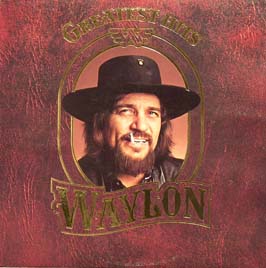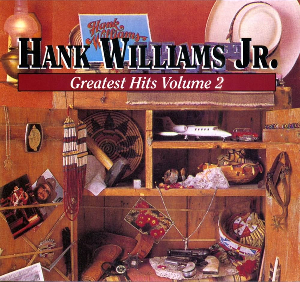Related Research Articles

Mirriam Johnson, known professionally as Jessi Colter, is an American country music artist who is best known for her collaborations with her husband, country singer and songwriter Waylon Jennings, and for her 1975 country-pop crossover hit "I'm Not Lisa".

"Hey, Good Lookin'" is a 1951 song written and recorded by Hank Williams, and his version was inducted into the Grammy Hall of Fame in 2001. In 2003, CMT voted the Hank Williams version No. 19 on CMT's 100 Greatest Songs of Country Music. Since its original 1951 recording it has been covered by a variety of artists.
"Mammas Don't Let Your Babies Grow Up to Be Cowboys" is a country music song first recorded by Ed Bruce, written by him and his wife Patsy Bruce. His version of the song appears on his 1976 self-titled album for United Artists Records. In late 1975 and early 1976, Bruce's rendition of the song went to number 15 on the Hot Country Singles charts. This song was featured on Chris LeDoux's album released January 20, 1976, Songbook of the American West.

Dreaming My Dreams is the twenty-second studio album by American country music artist Waylon Jennings. The album was co-produced with Jack Clement and recorded at Glaser Sound Studio in Nashville, Tennessee, between February and July 1974.

Greatest Hits is a compilation album by American country music artist Waylon Jennings, released in 1979 by RCA Records.

The Eagle is an album by American country music artist Waylon Jennings, released on Epic Records in 1990. It was the first of his two solo albums on the label, which he joined after a two-year stay at MCA. This was also the last new Waylon Jennings album to be made available on LP; commercially in Europe, and only through the Columbia House record club in the US.
"Honky Tonk Blues" was a hit country and western song written and performed by Hank Williams. The original 1952 recording was a major hit, and it later became a hit for later-day superstar Charley Pride.

Hank Williams Jr.'s Greatest Hits, Vol. 2 is a compilation album by country artist Hank Williams Jr. It was released in 1985 and was Williams' second compilation album on Warner Bros. Records. A critical and commercial success, the album peaked at Number One on the Billboard Top Country Albums chart, the second of his career to do so. The album was also certified Platinum by the RIAA, making it Williams' eleventh album to be certified Gold and the fifth to be certified Platinum. The album features ten tracks, nine of which were Number One or Top 10 songs on the Billboard Hot Country Singles & Tracks chart originally released from the studio albums High Notes, Strong Stuff, Man of Steel and Major Moves. The single "Two Old Cats Like Us" is a duet between Williams and R&B artist Ray Charles that was also featured on Charles' country album of duets, Friendship. The single was a moderate hit, peaking at number 14 on the Hot Country Singles & Tracks chart.
"Where Corn Don't Grow" is a song written by Roger Murrah and Mark Alan Springer. It was first recorded by Waylon Jennings on his 1990 album The Eagle, peaking at #67 on the country singles charts that year. Six years later, Travis Tritt covered it on his 1996 album The Restless Kind. Also released as a single, his rendition was a Top Ten country hit in 1997, peaking at #6 on the same chart. On April 12th 2021, rising country star Riley Green released a cover of the song in an ode to both Tritt and Jennings.
"Wrong" is a song written by Steve Seskin and Andre Pessis, and recorded by American country music singer Waylon Jennings. It was released in May 1990 as the first single from his album The Eagle.
"I'm a Ramblin' Man" is a song written by Ray Pennington. He recorded the song in 1967 for Capitol Records and took it to number 29 on the country charts.

"Are You Sure Hank Done It This Way" is a song written and performed by American country music artist Waylon Jennings. It was released in August 1975 as the first single from the album Dreaming My Dreams. The song was Waylon Jennings' fourth number one on the country chart as a solo artist. The single stayed at number one for one week and spent a total of sixteen weeks on the country chart.
"Is It Raining at Your House" is a song co-written and recorded by American country music artist Vern Gosdin. It was released in December 1990 as the second single from his compilation album 10 Years of Greatest Hits, but originally appeared on his 1987 album Chiseled in Stone. The song reached number 10 on the Billboard Hot Country Singles & Tracks chart; it was Gosdin's last top 10 and top 40 single on the country charts. Gosdin wrote the song with Dean Dillon and Hank Cochran.
"Only Daddy That'll Walk the Line" is a song written by Jimmy Bryant. Originally recorded by American country music singer Jim Alley, it was made famous by American country music singer and musician Waylon Jennings.
"Don't You Think This Outlaw Bit's Done Got Out of Hand" is a song written and recorded by American country music artist Waylon Jennings. It released in October 1978 as the second single from his album I've Always Been Crazy. The song peaked at number 5 on the Billboard Hot Country Singles chart. It also reached number 1 on the RPM Country Tracks chart in Canada.

"Can't You See" is a song written by Toy Caldwell of The Marshall Tucker Band. The song was originally recorded by the band on their 1973 debut album, The Marshall Tucker Band, and released as the album's first single. It was re-released in 1977 and peaked at number 75 on the Billboard Hot 100. Cover versions of "Can't You See" have charted for Waylon Jennings and the Zac Brown Band with Kid Rock (2010).

"Are You Ready for the Country?" is a song written by Neil Young and released on his 1972 Harvest album. The track features Young on piano backed by the studio band dubbed The Stray Gators, comprising Jack Nitzsche on slide guitar, Ben Keith on pedal steel guitar, Tim Drummond on bass, and Kenny Buttrey on drums. Backing vocals on the track are by David Crosby and Graham Nash. The recording was made in a studio set up in a barn on Young's ranch.
"If Ole Hank Could Only See Us Now" is a song co-written and recorded by American country music artist Waylon Jennings. It was released in January 1988 as the second single from the album A Man Called Hoss. The song reached number 16 on the Billboard Hot Country Singles & Tracks chart. The song was written by Jennings and Roger Murrah.
"The Conversation" is a song recorded by American country music artists Waylon Jennings and Hank Williams Jr. Originally, the song was included on Williams Jr.'s 1979 album Whiskey Bent and Hell Bound. The track was later reissued on Jennings' 1983 album Waylon and Company, which consisted almost entirely of duets, and was released as the album's second radio single. A music video was made to promote the single, a rarity for country music at the time. It was the first for Jennings and the second for Williams, with his first being "Queen of My Heart". The song was a moderately successful hit and reached number 15 on the Billboard Hot Country Singles & Tracks chart.
"Stop the World " is a song written and originally performed by Carl Belew. It was released as a single first by Belew in January 1958. It was later followed by competing versions by Patsy Cline and Johnnie & Jack. The latter duo's version became the first successful version of the song to be a hit. It was later covered a decade later by Waylon Jennings and then again by Susan Raye in 1974.
References
- ↑ Whitburn, Joel (2004). The Billboard Book Of Top 40 Country Hits: 1944-2006, Second edition. Record Research. p. 176.
- ↑ "Top RPM Country Tracks: Issue 1490." RPM . Library and Archives Canada. April 13, 1991. Retrieved August 16, 2013.
- ↑ "Waylon Jennings Chart History (Hot Country Songs)". Billboard.